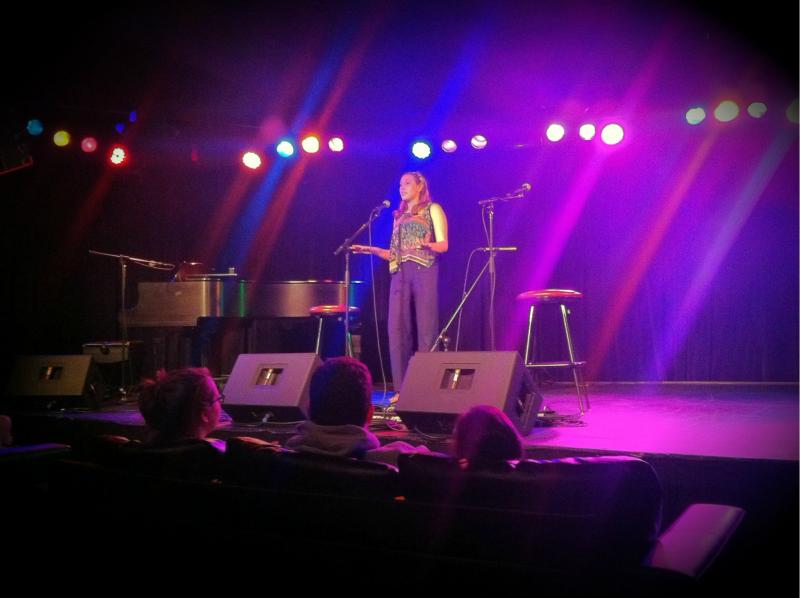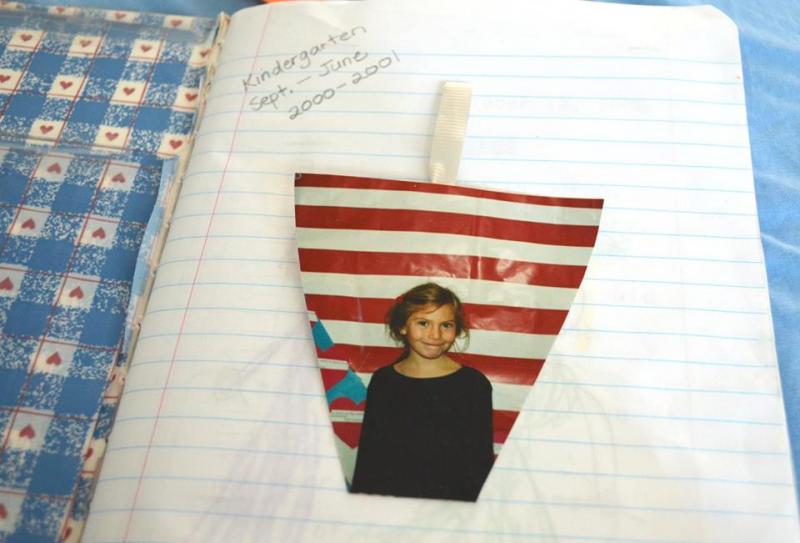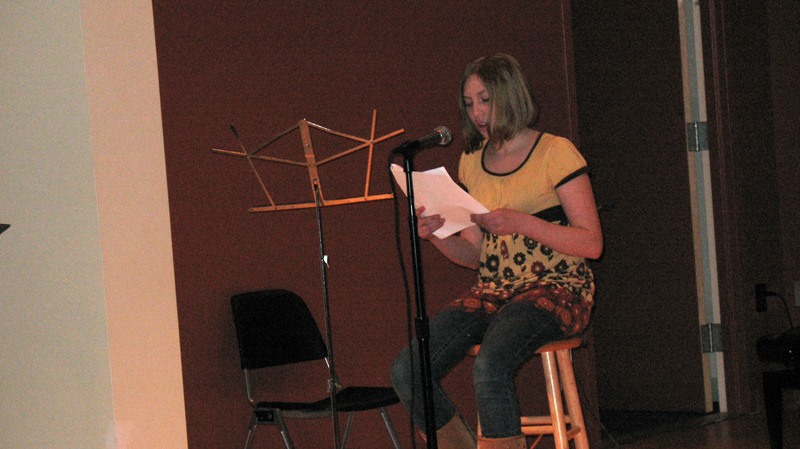Interview With Ariel Sobel: Writer And Slam Poet

After meeting Ariel Sobel in person, it's not hard to imagine her onstage. Even within the banalities of casual conversation, she finds room for sweeping gestures and unabashed proclamations, speaking in frenetic, charmed rhythms that echo the intricately composed poetic outbursts she performs behind microphones. With a penchant for loud patterns and flowery headbands, Sobel is clearly someone unafraid to express herself - an area she sparkles in both onstage and off.
I recently had the opportunity to sit down with the 18-year-old veteran slam poet to discuss her thoughts on poetry, activism and writing and performing in general - all of which you can read in our interview below.
***
S: Do you remember the first poem you wrote?
AS: Yeah, I actually do. I wrote it in third grade, and it didn’t really make any sense, but it sounded really pretty. I was so proud of it. It was four lines, so I memorized them and repeated them over and over to myself. And later, when I was in sixth grade, it was like my signature poem. I brought it into the school’s literary art magazine and they were like: “It’s small… we think it’s good, but…”
So I extended it into a full length poem called “My Starry Night,” and I just really liked it. It was a cute little kid thing, but it was me playing with words and, you know, having the first chance to write things down just because they sound pleasing to the ear.
S: Was there a role model you first had that turned you onto slam poetry?
AS: Well, where I grew up – because I grew up in a suburban area – slam poetry didn’t have a big presence at all, and the only time I was first exposed to it was when I was like, in the seventh or eighth grade and I saw a video by Sarah Kay, who is a fantastic slam poet...It was called “Hands.” I went home and I wrote a poem for a contest, and I wrote a poem about hands. It wasn’t hers – it was like my version of an idea of it.
The idea that you could write things down that have that kind of flow, and that kind of fluidity to them, was really my first step towards slam poetry. But I think it came to me because I always liked public speaking; I was never good at acting, but I always liked presenting work. In poetry readings I always wanted to read it out loud and read it with expression, because people liked it better that way.
Over time, I became more and more exposed to slam poetry and to just the internet in general, and so many great poets like Rudy Francisco, George Watsky, Sarah Kay, Phil Kaye, Taylor Mali… the list goes on and on, because there’s just so many wonderful people. I picked and chose from a bunch of different styles to help me find my voice and use different skillsets. Like, I took rhyme from Gemini, and then I took really interesting poetic use of language and – I’m trying to think of the best way to describe it – using atypical things to describe your emotions from Rudy Francisco. And then I’d watch and see the plain honesty, the not-putting-on-a-show, from Sarah Kay. I don’t know – I just threw it all together and eventually became what I am… and I think it’s no longer anyone’s voice, it’s just mine.

S: Interesting. Would you say you consciously took from those other poets’ styles?
AS: Yeah. I did. There are a lot of poems… I can do rhymes really fast. I don’t do it on my poems, but a lot of poems people really like because I can spit really quickly, and that’s a skill I definitely picked up from watching people do it. I always liked rhyming as a kid, I think I have an affinity to it, which is really lucky and fortunate. The idea of stream-of-consciousness flowing through rhymes, and how that connects it all together… I definitely picked that up from people like George Watsky or Gemini. I saw that as a skillset that I wanted to have, and took it from them.
S: You said that you come from a public speaking background. Do you think you would still write poetry if you didn’t perform it?
AS: Yeah. I still write – you know, I’m a screenwriting major; I write things all the time...personal things. And there are poems I write still that aren’t meant to be spoken out loud. I think writing is integral to who I am, but I think the reason why I’m so drawn to slam poetry is because it’s such an immediate reward. People react and respond to what you’re saying just as you say it. It becomes less about a piece of writing, and more about me and my voice and my story, because it’s coming out of my body, you know? I’m presenting it and I’m getting up on stage and saying, “This is who I am and this is what I have to say,” and I think it just becomes even more important and more beautiful and powerful to me because I’m speaking it out loud. Like, I think I’d still be a writer if I didn’t have slam poetry, but I’m glad I do because I think it’s made it such a more rewarding experience to be a writer.
S: What’s your favorite piece or performance you’ve done so far?
AS: I don’t know. I think everything I write is a different piece of myself I’m showing. So it’s like choosing what part of yourself you like the most to show people, you know? It’s kind of hard. I’ve had poems that I think are more crowd-pleasers than others, and over time I begin to really hate them and regret them because I feel like I’ll never live up to them. And a lot of the ones that are crowd-pleasing are less personal, and I feel like I’m putting on more of a show.
I really think that my greatest performance – though it’s not slam poetry – was my Tommy Talk, because it was just so emotionally open. Because I’m usually always putting on a show – I’m saying really personal things, but I’m more performing them than being affected with it. But when I was saying my Tommy Talk, it I really felt like I was feeling those words and living those experiences. I was just talking about me and my life. For the first time in a long time I think I had a visceral, emotional reaction to my own work, which I think was kind of special. Because you lose that, when you’re performing.

S: So you talked about your involvement with Tommy Talks. Could you go more into that?
AS: Tommy Talks is a USC program that just came to be, it’s really great. It’s about getting inspired by the people around us. Basically, they’re asking people to apply and do a “TED talk” about anything they care about, making sure that it relates to USC and our community and the people around us. It was a great experience, people came for the premiere – and what is more exciting is the launch of the videos, which we hope will be shown across USC and get some new voices heard. It’s completely student-run.
Essentially my talk is about my journey as a slam poet, and being very emotionally open in a world where I believe that we view emotional vulnerability as a weakness. It’s about how we shouldn’t be afraid to show people our scars and show people who we are, without putting barriers between ourselves and our emotions. It’s about how the way we view the world has become so guarded that it’s caused so many problems. That it’s been the reason we have hookup culture. The reason why people can’t ask for help when they’re depressed, leading to suicide. The reason why we are afraid to be more than our gender norms. And it’s about my evolution as being someone who couldn’t talk about who I was, because I was too afraid of appearing damaged or weak – to being someone who can get up on stage and tell my most personal, deepest, darkest secrets and not give a f**k.
S: What are your thoughts on using slam poetry as a form of activism, as many slam poets do?
AS: I actually have mixed views about it. Because I really hate slacktivism. I really hate the idea of just spreading a word or an awareness, or pressing a button or telling you about things and not actually doing it. That really pisses me off. I think slam poetry… a lot of it is and came originally to get justice for people who don’t have a voice. And I think that it should exist for the activism of giving people a voice, and taking back their narrative and getting to tell it themselves. I think it’s better when it’s about you as a person and your life experience than just trying to indoctrinate people into your suffering. There are a lot of things that I consider pity poems, and it’s very important to me to never degrade myself to a victim, and just be like – this is me, this is what I’ve grown from, this is what I believe. And I’m not trying to convince people of anything, I’m just saying how I feel.
I feel like activism is essentially important, but I think that I want to write things that move people emotionally - and that is its own activism - but I think it’s more important if you want to change the world... you should be getting into a protest, you should be calling up your senator, you shouldn’t just be sitting at home writing a poem. “A hashtag is not a movement,” as Shonda Rhimes once said. It’s not. No matter what you write on your Facebook or on your blog, that’s not going to change things. You have to actually do it. You should put up or shut up.
S: What slam poet or poem would you say has resonated with you very deeply?
AS: There are so many… there’s one I think that really got me. There are a lot of really famous slam poems – like there’s Sarah Kay’s “If I Should Have A Daughter” or “B,” and there’s Rudy Francisco’s “Scars” and Watsky’s – well, everything Watsky does, he’s just f*****g great. But I think the poem that resonated the most with me was called “Poetic Bloodlines” by Gemini. It’s about a guy who sits down and God takes him and takes his arm out, and - using a pen as a needle - puts into his blood all the things of the poets that came before him. And now he’s part of a poetic bloodline of people who tell their story. It’s beautifully done, his rhymes are incredible and he references many brilliant poets. It’s about the idea that being a writer is like almost being your own race of people; it’s taking on a heritage.
For me, it’s so close to my identity. It’s part of who I am to the point that I feel like I’m from a poetic bloodline. I feel like I am standing on the shoulders of my ancestors. My ancestors are Edgar Allen Poe, my ancestors are Sylvia Plath. I know that sounds pretentious – that doesn’t mean I’m as good as them, I’m definitely not – but I feel like I come from them. Like their footprints have led to where I’m standing.
I think it’s a beautiful kind of idea, that all poets are connected and anyone who writes slam poetry… it’s something we can connect over – any kind of writer. Writers… it’s a certain kind of lifestyle, and it’s a certain kind of art form that resonates with people so deeply. There are people who write, and then there are writers. It's been one of the proudest things and most important things in my life, to call myself a writer.
S: What piece of writing advice would you give to other writers?
AS: Don’t write for other people.
***
Keep your eyes out for the video of Ariel’s Tommy Talk, “Strip, Don’t Tease,” out November 4th!
Read Ariel’s poetry on her blog - there's a lot. My personal recommendation: “The Emotional Slut Is An Artistic Addict.”
Contact Staff Reporter Sivani here.



